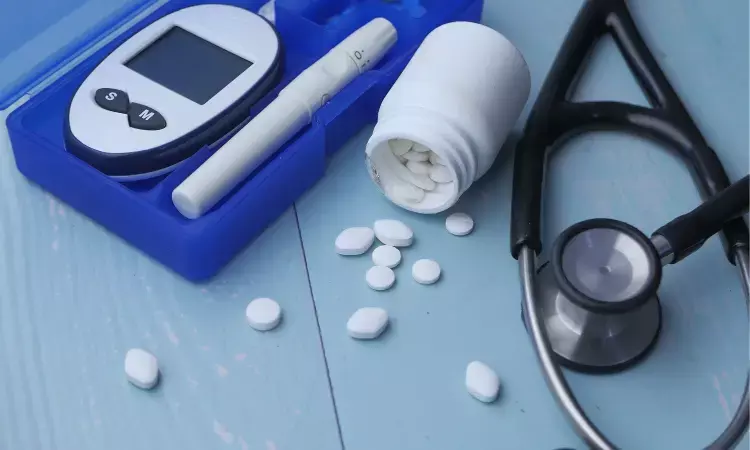- Home
- Medical news & Guidelines
- Anesthesiology
- Cardiology and CTVS
- Critical Care
- Dentistry
- Dermatology
- Diabetes and Endocrinology
- ENT
- Gastroenterology
- Medicine
- Nephrology
- Neurology
- Obstretics-Gynaecology
- Oncology
- Ophthalmology
- Orthopaedics
- Pediatrics-Neonatology
- Psychiatry
- Pulmonology
- Radiology
- Surgery
- Urology
- Laboratory Medicine
- Diet
- Nursing
- Paramedical
- Physiotherapy
- Health news
- Fact Check
- Bone Health Fact Check
- Brain Health Fact Check
- Cancer Related Fact Check
- Child Care Fact Check
- Dental and oral health fact check
- Diabetes and metabolic health fact check
- Diet and Nutrition Fact Check
- Eye and ENT Care Fact Check
- Fitness fact check
- Gut health fact check
- Heart health fact check
- Kidney health fact check
- Medical education fact check
- Men's health fact check
- Respiratory fact check
- Skin and hair care fact check
- Vaccine and Immunization fact check
- Women's health fact check
- AYUSH
- State News
- Andaman and Nicobar Islands
- Andhra Pradesh
- Arunachal Pradesh
- Assam
- Bihar
- Chandigarh
- Chattisgarh
- Dadra and Nagar Haveli
- Daman and Diu
- Delhi
- Goa
- Gujarat
- Haryana
- Himachal Pradesh
- Jammu & Kashmir
- Jharkhand
- Karnataka
- Kerala
- Ladakh
- Lakshadweep
- Madhya Pradesh
- Maharashtra
- Manipur
- Meghalaya
- Mizoram
- Nagaland
- Odisha
- Puducherry
- Punjab
- Rajasthan
- Sikkim
- Tamil Nadu
- Telangana
- Tripura
- Uttar Pradesh
- Uttrakhand
- West Bengal
- Medical Education
- Industry
Tryptophan and serotonin levels, a new approach for early diagnosis of diabetes complications?

Iran: The levels of serotonin (5-HT) and tryptophan (Trp) could be used for the early diagnosis of diabetes mellitus (DM) complications as well as many other complications, a recent study in the Journal of Diabetes & Metabolic Disorders has concluded.
Previous studies have shown that alternations in the serotonergic system may play a role in the pathogenesis of altered neurological and psychiatric diseases. Recently, tryptophan and serotonin levels have been considered potent biomarkers of diabetes. Kamyar Khoshnevisan, Shahid Beheshti University of Medical Sciences, Tehran, Iran, and colleagues, therefore, aimed to explore their role as potent biomarkers in diabetes mellitus complications.
It is suggested that different Trp metabolism may also play roles in the DM pathogenesis and mounting risk of complications. The whole blood (WB) 5-HT level was found to be lower among diabetics compared to others. That is mostly derived from a lower platelet concentration of 5-HT in these patients.
Key takeaways from the study:
- The 5-HT level can be considered a potent biomarker for the early detection of DM complications.
- It was also proved that outside the digestive and central nervous systems, 5-HT was discovered in beta cells, and scientists have been attempting to realize its mechanism of action ever since.
- Towards the end, the determination methods, biomarker's role, and approaches of 5-HT and Trp levels were thoroughly investigated in both healthy and diabetic patients with or without complications.
- The association between insulin and 5-HT has been specifically discussed.
- In most cases, increases in 5-HT and insulin levels have been observed simultaneously in beta cells.
Based on the study, the authors conclude, "Trp and 5-HT levels could be exclusively applied for early diagnosis of DM complications as well as many other complications."
Reference:
Khoshnevisan, K., Chehrehgosha, M., Sajjadi-Jazi, S.M. et al. Tryptophan and serotonin levels as potent biomarkers in diabetes mellitus complications: a new approach of diagnostic role. J Diabetes Metab Disord (2022). https://doi.org/10.1007/s40200-022-01096-y
Dr Kamal Kant Kohli-MBBS, DTCD- a chest specialist with more than 30 years of practice and a flair for writing clinical articles, Dr Kamal Kant Kohli joined Medical Dialogues as a Chief Editor of Medical News. Besides writing articles, as an editor, he proofreads and verifies all the medical content published on Medical Dialogues including those coming from journals, studies,medical conferences,guidelines etc. Email: drkohli@medicaldialogues.in. Contact no. 011-43720751


